This year’s Spring Meeting covered an array of exciting topics. Advance CTE staff reflects on the meeting in this three-part blog series.
Exploring Equity in CTE
At the 2018 Spring Meeting, Advance CTE formally launched our initiative on equity in CTE with a panel and breakouts devoted to that topic. This year I had the great honor of presenting on the results of that work so far, including the adoption of Advance CTE’s Statement on Equity in CTE, as well as the release of three publications under the Making Good on the Promise series.
I then moderated a panel of national experts on equity topics to reflect on how we can continue to tackle this work as a community of state and national leaders. The panelists were: Kisha Bird, Director of Youth Policy, CLASP; Nina Salomon, Deputy Program Director, Council on State Governments Justice Center; and Johan Uvin, President, Institute for Educational Leadership. The panelists discussed using data to ensure equitable resource distribution, developing partnerships across agencies and states to further equity efforts, and how state agencies can increase diversity within their own hiring practices. States have numerous opportunities under Perkins V to advance equity for each learner using CTE, but they will require bold action and some tough conversations. I am excited to continue to support our members in this work.
Ashleigh McFadden, State Policy Manager
Drawing on the content of the Making Good on the Promise briefs, Advance CTE hosted a series of equity breakouts during the 2019 Spring Meeting. These equity breakouts challenged state leaders to think about how they can examine and use data to define the equity problem in their respective states; build trust with historically marginalized communities; ensure access to CTE opportunities for each learner; design a supportive environment for each learner; and deliver equitable outcomes for learners.
I was one of the facilitators for the equity breakout that focused on building trust with historically marginalized communities. I was struck by how open and honest state leaders were about equity gaps in their respective states and their commitment to closing those gaps. Participants in the session discussed how to engage historically marginalized communities and message high-quality CTE to appeal to various populations. As state leaders continue to work towards closing equity gaps, I’m excited to see how they will be bold in their approaches.
Brianna McCain, State Policy Associate
A Conversation with CTE Champions in Congress
At last year’s Spring Meeting, I moderated a discussion about the prospects and plans for the reauthorization of the Carl D. Perkins Career and Technical Education Act of 2006 and while I remained optimistic, it was unclear if the law would be reauthorized in the 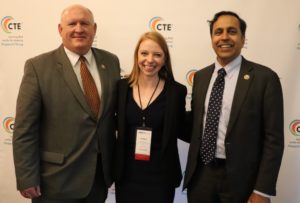 115th Congress. Fast forward one year and the reauthorization – the Strengthening Career and Technical Education for the 21st Century Act (Perkins V) – has been on the books for more than eight months! However, we certainly wouldn’t be in this position without the leadership of the law’s co-sponsors in the U.S. House of Representatives, Congressmen Raja Krishnamoorthi (D-IL) and Glenn ‘GT’ Thompson (R-PA). Advance CTE was thrilled to have these two dedicated CTE champions join us at this year’s Spring Meeting and I was honored to have the privilege of moderating the conversation.
115th Congress. Fast forward one year and the reauthorization – the Strengthening Career and Technical Education for the 21st Century Act (Perkins V) – has been on the books for more than eight months! However, we certainly wouldn’t be in this position without the leadership of the law’s co-sponsors in the U.S. House of Representatives, Congressmen Raja Krishnamoorthi (D-IL) and Glenn ‘GT’ Thompson (R-PA). Advance CTE was thrilled to have these two dedicated CTE champions join us at this year’s Spring Meeting and I was honored to have the privilege of moderating the conversation.
During this session, the Congressmen discussed why they got involved in the reauthorization. Representative Thompson (R-PA) shared how CTE “is a significant rung on the ladder of opportunity,” while Representative Krishnamoorthi (D-IL) discussed how CTE plays a role in restoring America’s middle class and connecting to postsecondary education, as he pointed out that, “Even if a four-year degree isn’t in everyone’s plans, a quality postsecondary education has to be.” Both Congressmen are looking forward to the implementation of the law and emphasized the importance of engaging the many stakeholders that CTE has and the opportunity to coordinate and collaborate with business and industry leaders. When asked about how the federal investment in CTE has made a difference in their districts, Representative Krishnamoorthi (D-IL) described an automotive technology program in his district that enrolled nearly the same number of male and female learners and how the program was making in a difference in his community and Representative Thompson (R-PA) told a story about how a CTE program in Pennsylvania was transformational in the life of a learner with a disability. The bipartisan agreement about the value and promise of CTE was clear – Representatives Thompson (R-PA) and Krishnamoorthi (D-IL) have visited each other’s districts and enjoyed sharing about their joint appearances and interviews. It’s not a surprise as to why – the energy and excitement they have for CTE is sure to inspire any audience, let alone a room full of CTE leaders at our Spring Meeting!
Kathryn Zekus, Senior Associate, Federal Policy


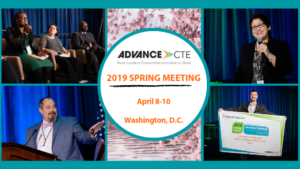 sponsor for bringing your wonderful energy and insight to make this year’s meeting one of the most memorable I’ve had in my time with Advance CTE.
sponsor for bringing your wonderful energy and insight to make this year’s meeting one of the most memorable I’ve had in my time with Advance CTE. 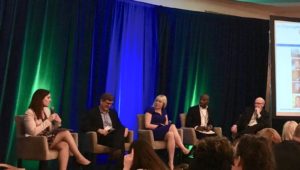 every learner can benefit from CTE pathways and programs; strengthening our data and measures so stakeholders can make more informed decisions about credentials, work-based learning and overall investments; and ensuring strong implementation by better connecting state policy with on-the-ground work. JPMorgan Chase – through Skills at Work and the related New Skills for Work – is supporting states and communities across the world to close the skills gaps and prepare learners for the future of work. The Joyce Foundation is building models of regional innovation and implementation of career pathways systems in the Great Lakes states (more to come on that soon!) and will be supporting Perkins V in the future. The Bill & Melinda Gates Foundation has identified pathways as a central focus of their new strategy, including support for Perkins V implementation over the coming years. And Lumina Foundation is evolving their work around credentials attainment to identify new models of postsecondary access and success. It was so heartening to share the stage with our philanthropic partners who are supporting such amazing work across the country!
every learner can benefit from CTE pathways and programs; strengthening our data and measures so stakeholders can make more informed decisions about credentials, work-based learning and overall investments; and ensuring strong implementation by better connecting state policy with on-the-ground work. JPMorgan Chase – through Skills at Work and the related New Skills for Work – is supporting states and communities across the world to close the skills gaps and prepare learners for the future of work. The Joyce Foundation is building models of regional innovation and implementation of career pathways systems in the Great Lakes states (more to come on that soon!) and will be supporting Perkins V in the future. The Bill & Melinda Gates Foundation has identified pathways as a central focus of their new strategy, including support for Perkins V implementation over the coming years. And Lumina Foundation is evolving their work around credentials attainment to identify new models of postsecondary access and success. It was so heartening to share the stage with our philanthropic partners who are supporting such amazing work across the country! The day started with a panel of national data quality experts, who unpacked the report’s major findings and called participants to action. Elizabeth Dabney, from the Data Quality Campaign, urged state leaders to use data as a bridge builder to break down silos across the secondary, postsecondary and workforce sectors. Ryan Ryena, from Education Strategy Group, echoed this idea and pushed states to go further and leverage their collective power to make bold improvements in the quality of their data. Bringing in the workforce perspective, Bryan Wilson from the Workforce Data Quality Campaign – a project of the National Skills Coalition – highlighted opportunities to align accountability and data collection between CTE and the Workforce Innovation and Opportunity Act (WIOA).
The day started with a panel of national data quality experts, who unpacked the report’s major findings and called participants to action. Elizabeth Dabney, from the Data Quality Campaign, urged state leaders to use data as a bridge builder to break down silos across the secondary, postsecondary and workforce sectors. Ryan Ryena, from Education Strategy Group, echoed this idea and pushed states to go further and leverage their collective power to make bold improvements in the quality of their data. Bringing in the workforce perspective, Bryan Wilson from the Workforce Data Quality Campaign – a project of the National Skills Coalition – highlighted opportunities to align accountability and data collection between CTE and the Workforce Innovation and Opportunity Act (WIOA). 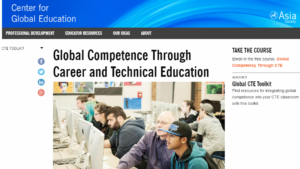
 for those facing the persistent racial, gender, and other inequities present in the country today.
for those facing the persistent racial, gender, and other inequities present in the country today.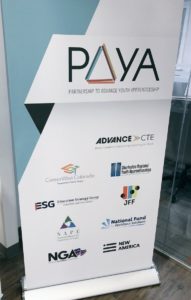 The partners of PAYA – Advance CTE, CareerWise Colorado, Charleston Regional Youth Apprenticeships, Education Strategy Group, JFF, the National Alliance for Partnerships in Equity, the National Fund for Workforce Solutions, the National Governors Association and New America – will be working together over the next two years to explore the ways youth apprenticeship can be reinvented to better meet the needs of learners and employers.
The partners of PAYA – Advance CTE, CareerWise Colorado, Charleston Regional Youth Apprenticeships, Education Strategy Group, JFF, the National Alliance for Partnerships in Equity, the National Fund for Workforce Solutions, the National Governors Association and New America – will be working together over the next two years to explore the ways youth apprenticeship can be reinvented to better meet the needs of learners and employers.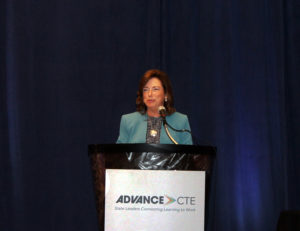 and leading more than 50,000 employees. Humpton began her remarks by emphasizing the importance Siemens places on investing in their employees. Th
and leading more than 50,000 employees. Humpton began her remarks by emphasizing the importance Siemens places on investing in their employees. Th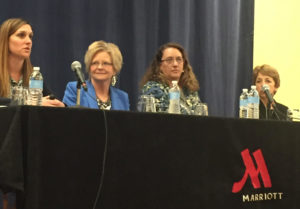 Partnerships and Collaboration” on how state leaders in Career Technical Education (CTE) can build meaningful relationships. Kate Kreamer, Deputy Executive Director of Advance CTE, moderated this session, and encouraged the room to be intentional when building partnerships and evaluate not just the strength of the relationship but also the value.
Partnerships and Collaboration” on how state leaders in Career Technical Education (CTE) can build meaningful relationships. Kate Kreamer, Deputy Executive Director of Advance CTE, moderated this session, and encouraged the room to be intentional when building partnerships and evaluate not just the strength of the relationship but also the value. 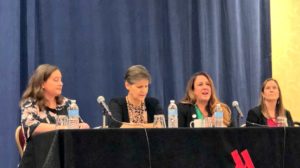 capacity, funding and policy from making any real progress on either front, leaving these two
capacity, funding and policy from making any real progress on either front, leaving these two 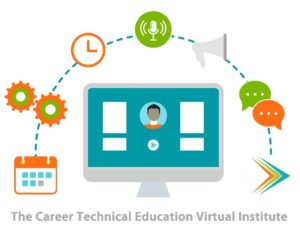 Last fall, Advance CTE launched the inaugural Career Technical Education (CTE)
Last fall, Advance CTE launched the inaugural Career Technical Education (CTE) 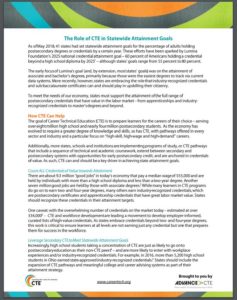 Some states have involved Career Technical Education (CTE) from the onset and others are now looking to ensure CTE is part of their overall strategy. The
Some states have involved Career Technical Education (CTE) from the onset and others are now looking to ensure CTE is part of their overall strategy. The